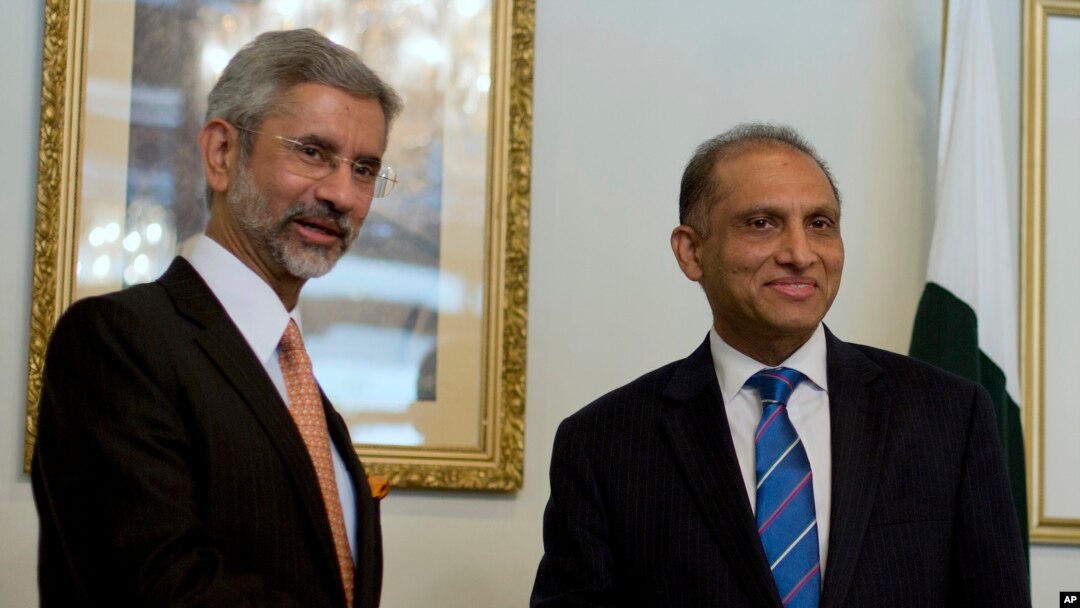After seven months of tension between nuclear-armed India and Pakistan, their top foreign diplomats met Tuesday here for talks that both men described as productive.
Indian Foreign Minister Subrahmanyam Jaishankar told reporters afterward that he and Pakistan’s Aizaz Ahmed Chaudhry "agreed to work together to find common ground and narrow our differences."
Chaudhry, in a separate press briefing following the day’s events, described "a cordial and constructive atmosphere" at their meeting at the foreign ministry.
"Both sides recognized that the two countries need to work together to address mutual concerns and make efforts to promote peace and development," Chaudhry said, alluding to a long-simmering Kashmir border dispute and terrorism, as well as economic development.
Your browser doesn’t support HTML5
Indian Foreign Secretary Visits Pakistan After Months of Tension
Jaishankar officially was traveling to discuss issues related to the South Asian Association for Regional Cooperation, on a tour taking him to the capitals of other member nations, including Bhutan, Bangladesh and Afghanistan.
His trip to Pakistan’s capital raised hopes that the two neighboring countries would be able to pick up threads of a frayed dialogue. Jaishankar did not say whether formal talks would resume.
Meeting had been delayed
The diplomats had been scheduled to meet last August, but Indian Prime Minister Narendra Modi had cancelled the appointment after Pakistani’s high commissioner in India, Abdul Basit, met with separatist leaders from the disputed Kashmir region.
Tensions have mounted as Indian and Pakistani troops exchanged fire across the Kashmir boundary intermittently since August. The latest incident, in January, killed at least a dozen people.
Modi, who has taken a tough stance on Pakistan over the last several months, likely faced domestic and international pressures to ease tensions with India’s western neighbor.
His Bhartiya Janta Party recently formed an alliance with the People's Democratic Party in Jammu and Kashmir that wants him to engage with Pakistan. U.S. President Barack Obama, during his recent trip to New Delhi, also "nudged" Modi to reopen talks with Pakistan, diplomatic sources indicated.
Anger lingers over Mumbai attacks
Jaishankar also raised the issue of bringing to justice suspects involved in the November 2008 terrorist attacks in Mumbai. The Pakistan-based militant group Lashkar-e-Taiba has been blamed for a series of coordinated attacks that killed more than 160 people.
Former Indian diplomat Jayant Prasad said people in Pakistan underestimate the attacks’ impact on the Indian psyche.
Indian authorities assert that Pakistan has been too slow to take action against the suspects and may be protecting some of them for strategic reasons.
According to the BBC, prime suspect Zaki-ur-Rehman Lakhvi is living in "relative luxury" in a Rawalpindi jail with several rooms, a television, a cellphone, the Internet and dozens of visitors a day.
Amit Singh Chadha, an Indian Supreme Court advocate, suggested Pakistan should transfer the Mumbai trials to the military courts that were formed in the country to deal with terrorism-related cases. This one step, he said, would bring the two countries closer than many other efforts.
Concerns about restive Pakistani areas
Pakistan, meanwhile, raised issues of Indian involvement in its restive Balochistan province as well as its tribal areas in the north during the meetings, according to Chaudhry.
Pakistan and India have yet to implement a deal they signed in 2012 to ease restrictions on visas for each other’s citizens. Both countries had different leadership at the time.
While there was not enough time to discuss all the details, both sides agreed to the broad strokes needed to "narrow differences" and "promote peace and development."
Better relations with Pakistan are also necessary to achieve the Indian prime minister’s stated aim of regional economic development, said Sushobha Barve of the New Delhi-based Center for Dialogue and Reconciliation.
Jaishankar, referencing the South Asian Association for Regional Cooperation, said, "India would like to work with Pakistan to help SAARC achieve its potential."
Pakistan, the regional association’s next chair, will host a 2016 summit to which member states’ leaders, including India’s prime minister, will be invited.
Realistic expectations urged
In Islamabad Tuesday, Jaishankar also met Sartaj Aziz, adviser to the Pakistani prime minister on national security and foreign affairs, and Tariq Fatemi, special assistant to the prime minister on foreign affairs.
During a courtesy call on Prime Minister Nawaz Sharif, Jaishankar handed over a letter from India’s prime minister.
Indian journalist Jyoti Malhotra, who visited Islamabad days before the foreign secretary as part of a delegation involved in private talks, warned against too many expectations too soon.
"Whether or not something comes out of this dialogue, big or small, the fact that he’s here is a good sign," Malhotra said.


